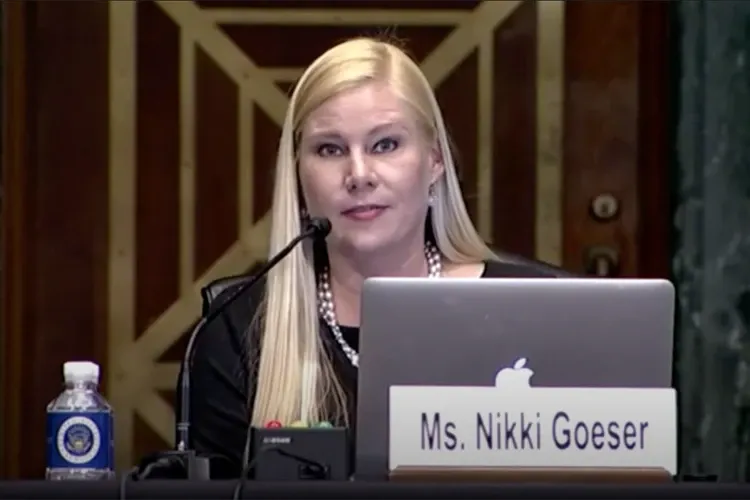If an individual is a stalking victim or suspects that he or she is being stalked, they should consider arming themselves.
That’s the message from stalking victim Nikki Goeser, who watched as a stalker murdered her husband in cold blood.
“I encourage victims to have a backup plan for their safety,” Goeser recently told the Legislature of Tennessee as it considered a bill to protect stalking victims.
“I personally choose to legally carry a gun for my own self defense. I carry it everyday and have had consistent training over the years. However, victims can choose for themselves what steps to take to best protect themselves. This is certainly an extra option. One I hope victims will take into consideration,” Goeser said.
In 2009, a man stalking Goeser murdered her husband right before her very eyes.
Goeser has dedicated her life to ensuring that people have the ability to defend themselves from violent attack. Over the last decade, she has become increasingly involved in pro-Second Amendment causes. Through hard work and dedication to Second Amendment advocacy, Goeser was able to attain the position of Executive Director at the Crime Prevention Research Center. Goeser has also served as Executive Director of the Congressional Second Amendment Caucus, and has testified before the US Senate and other high-profile legislative bodies.
In addition, Goeser authored Stalked and Defenseless, where she detailed the tragic nature of her husband’s death and her fight to bring him justice. The Executive Director of the Crime Prevention Research Center recently penned an op-ed for Fox News reiterating her pro-Second Amendment message for victims of stalking.
Goeser noted how January 2023 is the 19th annual National Stalking Awareness Month. She took time to highlight her experience “as a victim of a very serious and violent case of stalking” and offered readers a tangible solution to this serious public safety issue. Goeser spelled out how “Stalking is commonly defined as a pattern of behavior directed at a specific person that would cause a reasonable person to feel fear for the person’s safety or the safety of others; or suffer substantial emotional distress.” Moreover, she explained how stalking is a prevalent incident for many Americans, with “one in three women, and one in six men potentially being stalked in their lifetime.”
“A gun is a great equalizer, putting a female on equal footing against a male attacker.”
In 2009, a man stalking Goeser murdered her husband right before her very eyes. The couple owned a mobile Karaoke business in Nashville, Tennessee that attracted a diverse clientele, which included the would-be killer. In time, Goeser’s stalker would become a relatively frequent singer during karaoke nights.
Initially, the stalker sent Goeser various inappropriate messages on social media, which prompted her to delete and block him. Eventually, her husband confronted the stalker and told him to leave Goeser alone. Goeser stressed that the stalker did not send her threatening messages but were “what most women would describe as creepy and flirtatious.”
Interestingly, Goeser did not know her stalker very well and only knew him by his first name. It wasn’t until the tragic night of her husband’s murder that Goeser realized she was being stalked. The murder trial exposed the stalker for his “delusional” and “erotomaniac” tendencies.
Even behind bars, the stalker continued harassing Goeser by sending her twisted love letters that were designed to torment and terrify.
Even behind bars, the stalker continued harassing Goeser by sending her “twisted love letters” that were designed to “torment and terrify.” Goeser subsequently worked with legislators in her home state of Tennessee to set up “a new lifetime order of protection law for victims of the most serious violent crimes.” She noted this order was a necessary measure that the state had to take because offenders like her stalker are usually released from prison. Goeser’s stalker is expected to be released from prison in less than 10 years.
To avoid the potentially lethal outcomes of stalking, Goeser called attention to how 78% of stalking victims take some form of protective action which includes “calling the police, changing their name, a job change, moving, or obtaining an order of protection, etc.” However, she believes that stalking prevention “experts” ignore the “basic human right of self-defense” to confront stalkers. She is of the view that “getting professional firearms training, situational awareness training and carrying a gun for self-defense is the best security measure a person can make, especially for women.”
In addition, Goeser is of the opinion that a “gun is a great equalizer, putting a female on equal footing against a male attacker.” Though she did concede that carrying a firearm is not a guarantee for safety, but it does give individuals a fighting chance when they need it. She added that, “when seconds count, the police are likely minutes away.”
The Executive Director of the Crime Prevention Research Center concluded with the following statement: “Nobody is going to protect you as you can. At the end of the day, you are your own first responder.”
“Nobody is going to protect you as you can. At the end of the day, you are your own first responder.”
The Sentinel reached out to Goeser for her thoughts on how elected officials should address the issue of stalking. Goeser told The Sentinel the following:
Stalking victims should receive a lifetime order of protection law for victims of the most violent crimes all across the nation. If someone is granted an order of protection, there should be an immediate background check with no waiting period for a handgun carry permit.
For her, reducing barriers to handgun ownership is essential for stalking victims. Goeser is in favor of “reducing or eliminating costs for handgun carry permits for anyone granted an order of protection.”
“A Victim Compensation Program at the state level that would provide for victims to get free firearms training if the stalking and/or domestic violence victim decides that is what they want to do” is a measure that Goeser believes elected officials should pursue nationwide.
The Crime Prevention Research Center (CPRC), which Goeser helps lead, is a research and education organization that focuses on conducting academic research on the connection between laws regulating the ownership or use of firearms with crime, and public safety. The CPRC also focuses on educating the public, journalists, and elected officials on its research results. This organization was founded by pro-Second Amendment researcher John Lott, the author of More Guns, Less Crime, in 2013.




